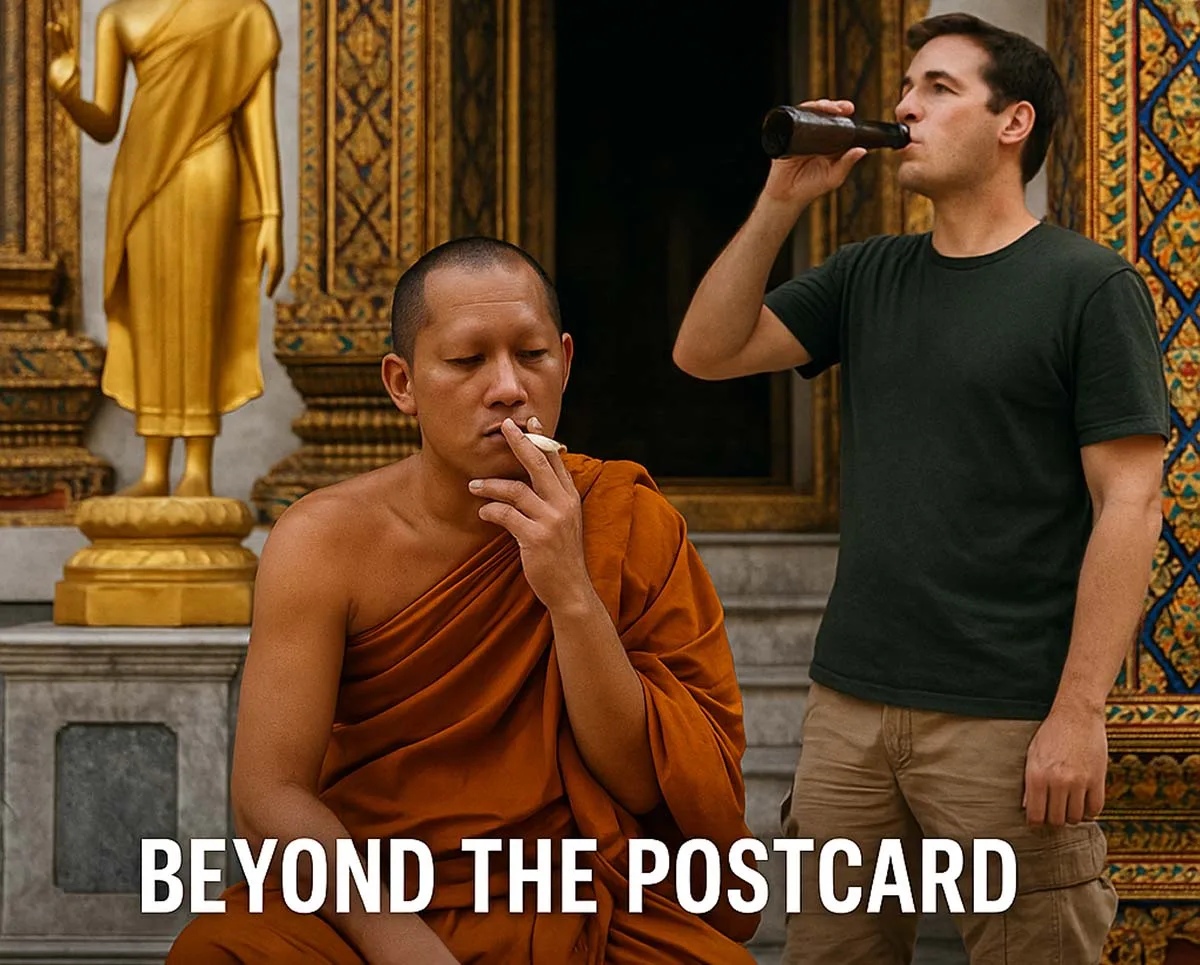“I remember walking through a soi in Nakhon Pathom, far from the tourist paths – the smell of grilled fish, the sound of dogs barking, and a small girl selling lotus flowers. That’s when I realized Thailand’s real poetry isn’t always pretty – but it’s always real.”
Thailand is often seen through a golden lens – ancient temples shimmering in the sun, monks in saffron robes walking peacefully at dawn, turquoise beaches stretching into forever. And yes, all of this exists. But behind the picture-perfect postcard lies a deeper, more complex reality. One that locals live every day, and observant travelers begin to notice too.
This is not a criticism – rather, it is a loving, honest look at the real Thailand: a land of beauty, contradiction, and heart.
🌅 The Land of Smiles - And Shades of Gray
Thailand’s nickname, the Land of Smiles, reflects the genuine friendliness you’ll experience in markets, taxis, and even remote villages. But Thai society is also built on subtle systems of hierarchy, status, and unspoken rules.
Behind every smile can be a range of feelings – happiness, discomfort, even frustration – because open confrontation is culturally discouraged. It’s all part of a social code that values saving face over expressing emotion.
🛕 Sacred Spaces, Everyday Realities
Temples (wats) are the spiritual heart of Thai life. They’re places of meditation, offerings, and community ceremonies. But for long-term travelers or expats, a different side sometimes emerges:
You may see monks using smartphones, smoking cigarettes, or chatting casually – even though monastic rules prohibit these behaviors.
Tourists (and locals) drinking alcohol near temple grounds or being loud in sacred spaces is more common than you’d expect, especially in urban areas or tourist-heavy zones.
Is it hypocrisy? Not necessarily. Thailand has a flexible approach to spirituality – religion is deeply respected, but people live in the gray areas between ideal and real.
🥃 Buddhism and Beer
Although Buddhism discourages intoxication, alcohol is everywhere in Thai society. It’s common at family gatherings, street stalls, weddings, funerals – even festivals like Songkran (Thai New Year), which often become wild water-and-whisky parties.
In beach towns and cities, nightlife is a major draw. Full Moon Parties, neon-lit bar streets, and 24-hour alcohol access stand in sharp contrast to the teachings of mindfulness and moderation.
🚔 Laws, Loopholes, and Local Logic
Thailand has strict laws – but how they’re enforced is a different story. Tourists are often surprised by things like:
Vaping being illegal, while alcohol and cigarettes are widely sold.
Monks begging at traffic lights, even though monastic rules discourage this.
Bribes or “fines” being requested by traffic police for minor offenses.
This is part of the informal system known locally as “Thai-style” problem-solving – flexible, adaptive, but sometimes confusing. However, the Thai government is running a big campaign against corruption, and it is already visible at every corner.
🐘 The Price of Tourism
Thailand thrives on tourism – but not all of it is ethical. While there are wonderful elephant sanctuaries and eco-lodges, there are also:
Elephant rides, circuses, and selfie spots that mistreat animals.
Tiger temples (now mostly shut down) where drugged animals were used for photos.
Sex tourism and exploitation that still operate under the surface in parts of cities like Pattaya, Patong, and Bangkok.
As a visitor, you should help shift this narrative by supporting responsible travel businesses and being conscious of where your money goes.
🧍 The Invisible Thailand
Beyond temples and beaches are communities that face real struggle:
Isaan (Northeastern Thailand) is one of the poorest regions, yet its people often migrate to Bangkok or tourist areas for work.
Stateless hill tribes in the north live without full citizenship or access to healthcare.
Migrant workers from Myanmar, Laos, and Cambodia often face harsh conditions in the fishing, farming, and construction industries.
These stories are rarely told – but they’re part of the real Thailand too. But this is not a situation that we can’t see in almost any other country all around the world.
🙏 Respect Through Understanding
This article isn’t about judging Thailand – it’s about loving it deeply enough to see all of it. The polished surface and the messy, human reality underneath. Let’s be honest, you can’t come to Thailand, spend some time here, and not love it. It’s impossible!
As a Blogger and traveler, my role isn’t just to admire temples and sunsets. It’s to look closely, listen carefully, and ask questions that matter. That’s how we move from being a tourist to a thoughtful guest.
💡 Final Thought
Thailand doesn’t need to be perfect to be magical. In fact, it’s the contrast between its serene beauty and its everyday contradictions that makes it so compelling. The monks who meditate in the morning and smoke in the afternoon. The temple bells that ring next to a 7-Eleven. The quiet rituals in the middle of noisy street life.
This is real. This is Thailand.
At Thai HUB, we’re not just telling you where to go – we’re sharing the stories that often go untold.
Have you ever looked beyond the temples and turquoise seas? What stories has Thailand whispered to you, when no one else was listening?
